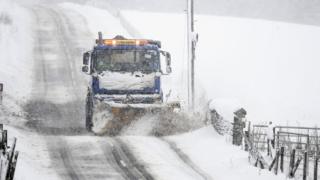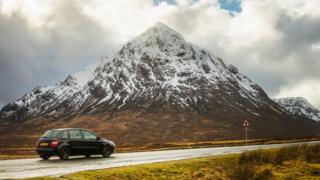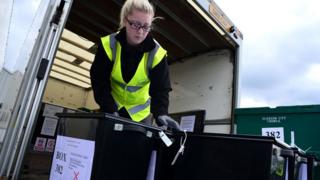 Image copyright Getty Images
Image copyright Getty Images
This week’s general election will be the first to take place in December since 1923. How have Scottish councils been preparing for the risk that bad weather could affect the count?
The Highlands and Argyll and Bute are Scotland’s two largest council areas, and are home to some of the country’s most rural and remote communities.
Their planning for Thursday’s election has had to take into account the risk that wintry weather could cause disruption.
Highland has already switched the location of its election count to a warmer venue, while Argyll and Bute has boats on standby to get ballot boxes to its count if conditions cause problems for helicopters.
A risk of snow in some areas has been a feature of a long-range forecast for this week.
BBC Scotland weather presenter Christopher Blanchett said Thursday, when voters go to the polls, was likely to be an “unsettled day”.
He said: “At this stage, it looks as though there’ll be a spell of wet and windy weather for most.
“Some of the rain will be falling as sleet or snow on the hills and high ground, down to around 300m (984ft), though falling mostly as rain to lower levels in towns and cities.”
He said it would be a cold day, with temperatures started at near freezing at dawn in central and eastern areas.
 Image copyright Getty Images
Image copyright Getty Images
The Highland Council area includes the Cairngorms and the upland areas of Lochaber, Sutherland and Wester Ross, as well as the Isle of Skye.
The local authority said it was “closely monitoring” the Met Office forecasts.
It has already switched its count from Ross County’s Dingwall Football Academy to the Inverness Leisure Centre because it is easier to keep warm.
The council has volunteers ready to drive 4x4s to assist anyone who gets into difficulty in remote locations or on the roads. They will be able to transport people and ballot boxes to secure locations.
A spokesman said: “If weather conditions are severe, we would set up a multi-agency coordinating group to assist with any events or incidents during the election process.
“We have made preparations to increase gritting around polling stations and to provide lighting around polling stations in the event of power cuts to ensure safe access and egress by voters and election staff.”
 Image copyright Getty Images
Image copyright Getty Images
Argyll and Bute Council has made similar preparations, with extra staff and gritters available to treat roads and pavements outside polling stations.
It also has boats on standby, which would be used if the two helicopters which have been hired to deliver votes from island polling stations are not able to fly.
There are more than 20 inhabited islands within the Argyll and Bute area, including Mull and Iona.
Other councils across the country are also keeping an eye on the forecast.
Scottish Borders Council said: “Although there are no immediate concerns, the weather is something we’ll continue to monitor closely.
“We have contingency plans in place including dedicated gritting resources and can call on partners, including local mountain rescue teams and a 4×4 vehicle club, if needed.”
‘Minimise disruption’
The Electoral Commission, the independent regulatory body which oversees elections, said councils had “significant experience” of providing public services throughout the year.
A spokeswoman said: “They will have contingency plans in place to help them respond quickly to minimise any disruption to polling because of adverse weather, and will do everything they can to ensure voters are able to cast their vote on 12 December.”
She said that the counting of votes would go ahead “as soon as it was reasonably practical to do so” if the weather was causing problems.
“Even if severe snow causes problems for getting ballot boxes in from one area, they would still be able to get boxes in from other areas and commence the count.
“You don’t need to have all the boxes in before you start.”
Original Article : HERE ;
from MetNews https://metnews.pw/what-happens-if-wintry-weather-hits-the-election/
No comments:
Post a Comment